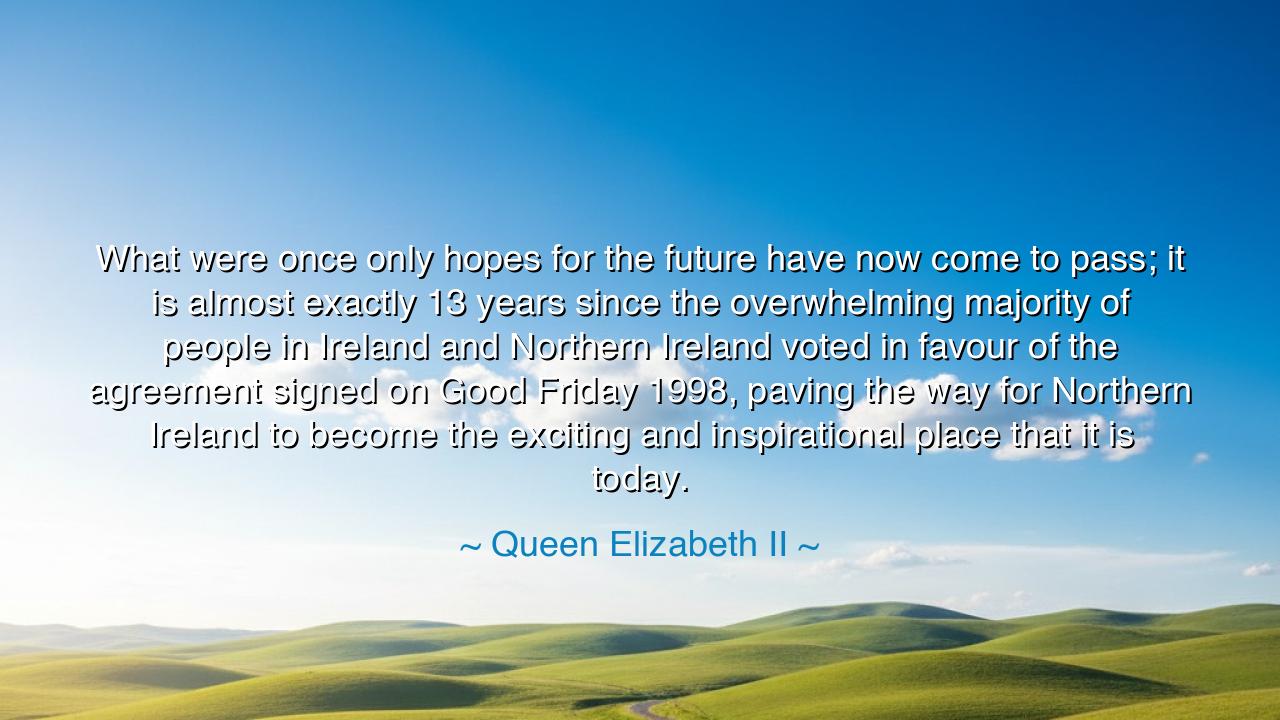
What were once only hopes for the future have now come to pass;
What were once only hopes for the future have now come to pass; it is almost exactly 13 years since the overwhelming majority of people in Ireland and Northern Ireland voted in favour of the agreement signed on Good Friday 1998, paving the way for Northern Ireland to become the exciting and inspirational place that it is today.






On Peace, Reconciliation, and the Fulfillment of Hope
When Queen Elizabeth II spoke the words, “What were once only hopes for the future have now come to pass; it is almost exactly 13 years since the overwhelming majority of people in Ireland and Northern Ireland voted in favour of the agreement signed on Good Friday 1998, paving the way for Northern Ireland to become the exciting and inspirational place that it is today,” she was not merely recounting history — she was bearing witness to one of humanity’s greatest triumphs: the transformation of conflict into peace, of division into unity, of hope into reality. Her words were the voice of gratitude echoing across centuries of struggle, reminding her listeners that peace, though fragile, is a divine fruit grown from human courage, forgiveness, and perseverance.
The Good Friday Agreement of 1998, to which she referred, was more than a political treaty — it was a covenant of the heart between peoples long divided by history. For decades, the land of Northern Ireland had been torn by violence — the Troubles, as they came to be known — a storm of blood and grief that pitted neighbor against neighbor, Protestant against Catholic, citizen against state. Generations were born into fear, and the dream of peace seemed a mirage on a distant horizon. Yet, through the courage of many — statesmen and mothers, rebels and priests, ordinary souls who had seen too much death — hope endured. And when the people of both Ireland and Northern Ireland voted overwhelmingly for peace, they did more than approve a document; they declared that love was stronger than hatred, and that the future would no longer be chained to the past.
It was this miracle of transformation that the Queen, with her characteristic grace and wisdom, sought to honor. Her words came not as a ruler’s proclamation but as a testament of faith — that time, when joined with human will and divine mercy, can heal even the deepest wounds. To her, the Ireland of 2011 was not simply a prosperous land; it was a living testament to the idea that history’s tragedies need not define its destiny. What had once been only the hopes for the future, faint as candlelight amid the smoke of war, had become the morning sun over a land reborn. In this, she celebrated not only political progress, but the victory of the human spirit.
This truth — that peace can rise from ruin — is as old as civilization itself. In the days of Athens and Sparta, blood once drenched the soil of Greece, and brother fought brother for glory. Yet when the Olympic truce was declared, armies laid down their arms to honor something higher than conquest — the shared dignity of humankind. So it was in Ireland, when ancient enmities yielded to understanding, and the warring factions learned to sit together, to listen, and to build a new world upon the ashes of the old. The Queen’s words, then, echo not only across the Irish Sea, but through the corridors of time, reminding all peoples that no conflict is eternal, no hatred invincible.
And yet, her message is not one of complacency, but of vigilance. Peace is not a monument built once and left to stand; it is a garden that must be tended daily, lest the weeds of resentment take root again. The Queen, wise in years and tempered by history, knew this well. Her reign had witnessed empires fade and nations rise, wars end and new challenges begin. In celebrating Ireland’s renewal, she also whispered a warning — that the maintenance of peace demands as much bravery as its creation. The work of reconciliation is never finished; it must be renewed in each generation, through patience, humility, and dialogue.
There is a deep lesson here for every age: that what seems impossible today may, through unity and will, become reality tomorrow. The Good Friday Agreement was not born of naïve optimism, but of hard-won faith — faith that even enemies can find common ground, that history’s chains can be broken, that the future is not fixed but forged by human hands. Each of us, in our own lives, faces divisions — between families, friends, or nations — that seem insurmountable. Yet, as the Queen’s reflection teaches, if we meet our conflicts not with bitterness but with courage and compassion, we too can bring forth peace from pain.
The lesson is eternal: do not despair of reconciliation, no matter how dark the hour. Remember that peace begins not in treaties or governments, but in the hearts of individuals willing to forgive. Be the voice that calms, not the hand that strikes. Be the bridge, not the wall. For when forgiveness triumphs over vengeance, when dialogue replaces silence, when the future is built not on fear but on faith — then, as in Ireland, what were once only hopes shall indeed come to pass.
Thus, the words of Queen Elizabeth II shall live beyond her age, not as the speech of a monarch, but as a hymn to humanity’s greatest calling: to turn swords into ploughshares, hatred into harmony, and sorrow into song. For peace is not the end of struggle, but the beginning of wisdom — and to choose it, again and again, is the noblest act of all.






AAdministratorAdministrator
Welcome, honored guests. Please leave a comment, we will respond soon